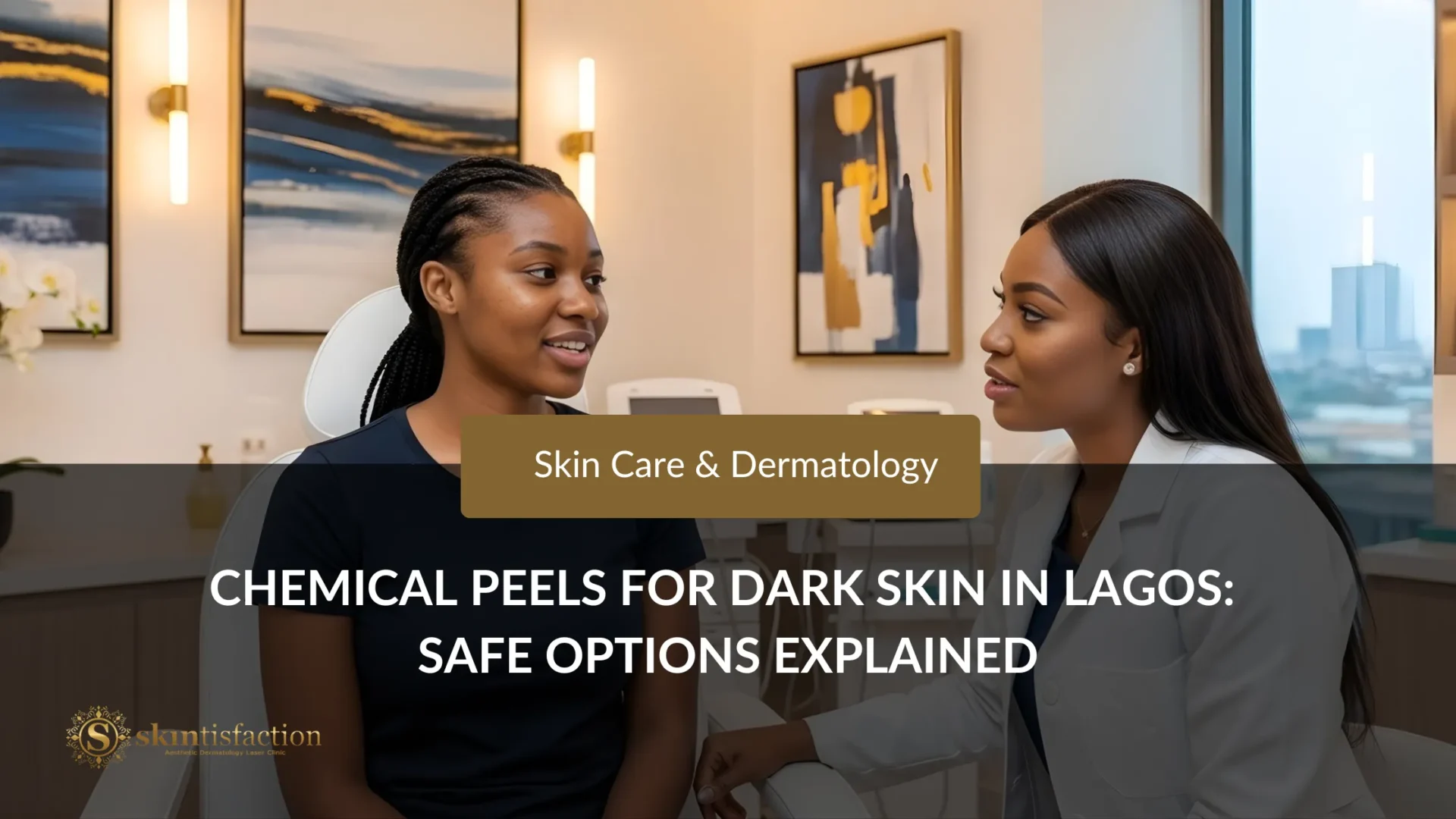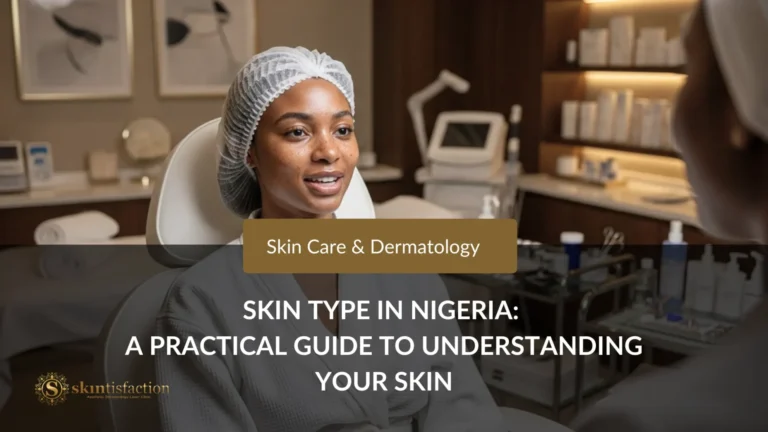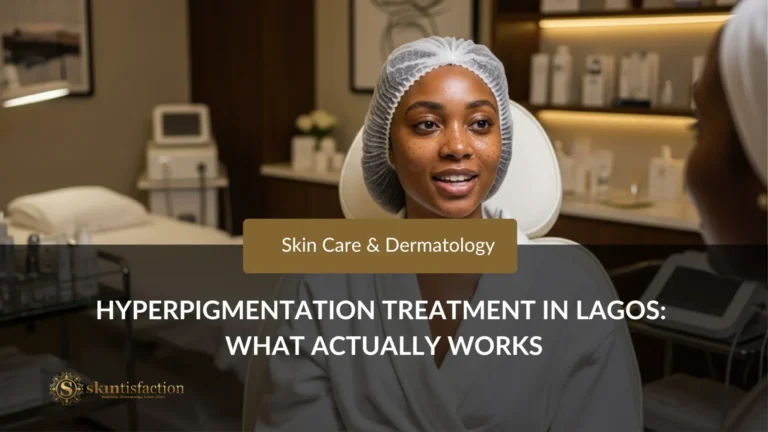The Safety Question Everyone Asks
If you’ve been researching chemical peels for dark skin in Lagos, you’ve probably hesitated because of horror stories about hyperpigmentation and uneven tone. You’re not alone. Many people with melanin-rich skin worry that chemical peels will leave them with patches or worse skin than when they started.
Here’s the truth: when performed by experienced professionals who understand how melanin-rich skin responds to treatment, chemical peels can be incredibly safe and effective. The problem isn’t the treatment itself. It’s inexperience.
At Skintisfaction Aesthetic, Dermatology & Laser Clinic, we’ve helped hundreds of Lagos residents with varying skin tones achieve brighter, clearer, more even-toned skin through carefully selected chemical peels. The key difference? We understand the science of melanin, the unique challenges of treating darker skin tones, and how Lagos’ climate affects healing and outcomes.
Let’s clear up the confusion and walk through what you actually need to know about getting chemical peels safely.
Why Chemical Peels for Dark Skin Require Special Expertise
The Science of Melanin
Melanin is what gives your skin its beautiful color, but it also makes your skin more reactive to certain treatments. When melanin-rich skin experiences inflammation or trauma, it can respond by producing even more pigment. This is called post-inflammatory hyperpigmentation, or PIH.
This is the biggest concern with chemical peels on dark skin. If the peel is too aggressive, applied incorrectly, or followed by poor aftercare, you could end up with dark patches that are harder to treat than your original concern.
The Expertise Gap
Not all aestheticians or clinics understand how to work with African skin. Some use the same protocols they’d use on lighter skin types, which can lead to complications. Others may be overly cautious and offer treatments that are too mild to produce results.
At Skintisfaction, Dr. Uzo Iloabachie and our dermatology team have specialized training in treating skin of color, following protocols from the American Academy of Dermatology and other international bodies. We assess your specific skin type on the Fitzpatrick scale, review your medical history, and always perform patch testing before your first full treatment.
Lagos Climate Considerations
Lagos’ intense sun, high humidity, and environmental pollution add another layer of complexity. Your skin is constantly exposed to UV rays (even on cloudy days), and pollution can irritate healing skin. This means post-treatment care has to be adapted to your daily environment, not just copied from a textbook.
The bottom line: Chemical peels aren’t inherently dangerous for dark skin. Inexperience is the danger.
Safe Chemical Peel Options for Dark Skin
Not all chemical peels are created equal, and not all are appropriate for melanin-rich skin. Here’s what you should know about the safest options.
Light/Superficial Peels (Safest Starting Point)
Glycolic Acid Peels at low concentrations gently exfoliate the top layer of skin. They’re effective for mild texture issues and dullness.
Lactic Acid Peels are gentler and more hydrating than glycolic acid, making them ideal for sensitive or dry skin types.
Mandelic Acid Peels have larger molecules that penetrate more slowly, which reduces the risk of irritation. This is one of the best options for darker skin tones.
Salicylic Acid Peels work well for acne-prone skin because they penetrate oil glands and unclog pores.
Benefits: Minimal downtime, lower risk of PIH, can be done regularly (every 4–6 weeks).
Medium-Depth Peels (Requires Expert Assessment)
TCA Peels (trichloroacetic acid) can be customized by concentration. When used at the right strength by an experienced dermatologist, they can address deeper pigmentation and acne scars.
Jessner’s Peel combines multiple acids and is effective for stubborn hyperpigmentation when properly managed.
When appropriate: These are used for more severe pigmentation issues or acne scarring, but only after proper skin preparation and under expert supervision.
Deep Peels (Generally Not Recommended)
Phenol Peels carry a high risk of causing permanent pigmentation changes in dark skin and are rarely appropriate for melanin-rich skin types.
What Chemical Peels Can Help With
Chemical peels can be transformative for a range of skin concerns common among Lagos residents:
- Hyperpigmentation and dark spots from acne, sun damage, or melasma
- Active acne and acne scars, including post-inflammatory marks
- Uneven skin tone and general discoloration
- Rough texture and enlarged pores
- Fine lines and early signs of aging
- Sun damage from years of UV exposure in Nigeria’s tropical climate
Important: Chemical peels work best as part of a comprehensive skincare routine, not as standalone treatments. Your dermatologist will recommend at-home products to support and maintain your results.
The Skintisfaction Approach to Chemical Peels
Here’s what makes our process different:
- Comprehensive Skin Assessment
We evaluate your skin using the Fitzpatrick scale, review your skin history, and assess your sensitivity and tolerance levels. - Patch Testing Protocol
We always perform a patch test before your first full treatment to see how your skin responds. - Customized Peel Selection
Based on your skin type, concerns, and lifestyle, we select the most appropriate peel type and concentration. - Pre-Treatment Preparation
We often prescribe a preparation routine 2–4 weeks before your peel. This might include gentle retinoids or brightening agents to prepare your skin and minimize PIH risk. - Post-Treatment Care Tailored to Lagos
We provide detailed aftercare instructions that account for sun exposure, humidity, and your daily routine in Lagos. - Follow-Up Monitoring
We schedule follow-up appointments to track your healing and adjust future treatments as needed.
Dr. Uzo’s international training includes specialized protocols for safely and effectively treating darker skin tones.
Learn more about our chemical peel services
How to Prepare for Your Chemical Peel
2–4 Weeks Before Treatment
- Stop using strong active ingredients like retinoids or acids (as directed by your dermatologist)
- Begin any prescribed pre-treatment products
- Avoid sun exposure and don’t tan
- Stop waxing or using other hair removal methods on the treatment area
The Week Before
- No facial treatments or exfoliation
- Stay well-hydrated
- Avoid inflammatory foods if you have sensitive skin
- Arrange time off work if needed (though most superficial peels require minimal downtime)
Day of Treatment
- Come with clean, makeup-free skin
- Avoid caffeine, which can increase sensitivity
- Bring sunscreen to apply after treatment
What to Expect During Your Treatment
Your appointment will typically take 30–45 minutes:
- Skin cleansing to prepare the treatment area
- Peel application – you may feel tingling or mild warmth
- Neutralization to stop the peel’s action
- Immediate post-treatment care – mild redness or tightness is normal
About “peeling”: On dark skin, peeling is often more subtle than on lighter skin. You might notice light flaking rather than dramatic sheets of skin coming off.
Post-Treatment Care for Dark Skin
First 24–48 Hours
- Gentle cleansing only
- Avoid heat, sweating, and sun exposure
- Use prescribed healing ointments
- Keep your skin well-hydrated
First Week
- Sun protection is critical: Use broad-spectrum SPF 50+ every day, even indoors. UV exposure is the fastest way to develop PIH after a peel.
- Use gentle, fragrance-free moisturizers
- Avoid makeup for at least 24–48 hours if possible
- Never pick or force peeling skin
- Drink plenty of water
Lagos-Specific Tips
- If you’re in traffic or outdoors frequently, reapply sunscreen every 2–3 hours
- Use a hat or umbrella for additional sun protection
- In humid weather, use lighter moisturizers to prevent clogged pores
- Keep your skin cool – avoid hot showers and steamy environments
Most people see visible improvement within 7–10 days, but optimal results usually require 3–6 treatments spaced 4–6 weeks apart. Between treatments, you can maintain skin hydration with HydraFacial treatments to support your results.
Red Flags: When Chemical Peels Are NOT Safe
Avoid chemical peels if you have:
- Active skin infections or open wounds (consult with our clinical dermatology team first)
- Recent laser treatments (wait the appropriate healing time)
- History of keloid scarring (requires extra caution and assessment)
- Current use of isotretinoin (Accutane)
- Pregnancy or breastfeeding (for certain peel types)
Warning Signs of an Unqualified Provider
Be cautious if your provider:
- Won’t perform a patch test
- Recommends deep peels immediately without proper assessment
- Doesn’t ask about your medical history or current skincare routine
- Has no specific experience treating dark skin
- Can’t clearly explain why they’re recommending a specific peel
Cost Considerations
Chemical peel costs in Lagos vary based on the type of peel, treatment area, and whether you’re purchasing a series of treatments. Many clinics offer package deals that provide better value for multiple sessions.
While it might be tempting to look for cheaper options, remember that professional treatment by experienced dermatologists is an investment in your skin’s health and safety. The cost of correcting complications from an improperly performed peel can far exceed the cost of doing it right the first time.
Contact Skintisfaction for personalized pricing based on your specific skin goals and treatment plan.
Frequently Asked Questions
Ready for Radiant, Even-Toned Skin?
Chemical peels can be truly transformative for dark skin when performed by professionals who understand melanin-rich skin and follow proven safety protocols. You don’t have to live with hyperpigmentation, acne scars, or uneven tone.
At Skintisfaction, we’ve helped countless Lagos residents achieve brighter, clearer, more confident skin through safe, expertly administered chemical peels. Our team specializes in treating all skin types with international standards of care adapted to Nigeria’s unique environment.
Ready to explore safe chemical peel options for your skin? Book your consultation with Skintisfaction today. Call us or visit our Lekki clinic to discuss your skin concerns and create a personalized treatment plan.
Located in Lekki with expertise in treating all skin types safely and effectively.






